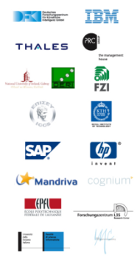D5.1 - Community Support Software First Version
D5.1 - Community Support Software First Version
| Title | D5.1 - Community Support Software, First Version |
|---|---|
| Publication date | 31 June 2007 |
| Dissemination level | Public |
| File link | D5.1-NEPOMUK-First_Version_community_Support_Software.pdf |
WP5000 investigates and exploits the knowledge exchange in social networks and provides tools and services for community identi cation and analysis and for supporting knowledge exchange in these semantic social networks. The goal of the rst deliverable is to provide a rst version of the community sup- port software which is composed by a documented and tested prototype of a community detection algorithm and (semi-) automatic metadata alignment. The deliverable provides community detection and metadata alignment func- tionalities, packaged as two components, Community Manager and Metadata Aligner, and integrated into the NEPOMUK component architecture. Although they are not applications on their own, they form an infrastructure which can be adopted and used by other applications.
Our work resulted in the following:
- The Community Manager component, which identi es social structures in the network of NEPOMUK peers, analyzes these structures and provides methods for other components or applications to access the results.
- The Metadata Alignment component, being responsible for generating mappings between ontologies used by different peers in the NEPOMUK network.
- we describe how the folksonomy structure of the NEPOMUK network can be analyzed to detect communities of users within the network, introducing social resource sharing systems and formalizing the underlying data structure called folksonomy;
- we present the FolkRank algorithm and its application to community detection;
- we describe the Trias algorithm for mining frequent closed tri-sets of a folksonomy.
The main task of the Metadata Aligner component is to identify relationships between personal ontologies as created and used by end users. Knowledge of relationships is necessary to implement features such as recommendation of similar documents within the workspace of other users as well as enhancing semantic search. Within the scope of NEPOMUK, we will not formally infer class relationships, but gather evidence for such relationships. This is due to the fact that the PIMO ontologies we want to align are ontologies created by end-users, therefore mostly having a kind of ad-hoc character instead of being completely formally sound.
For the realization of the Metadata Aligner component, we present a framework that collects and integrates heuristic evidence for ontology mappings. The framework can employ three basic sources of evidence for ontology mappings, namely term-based, topology-based and instance-based evidence.
We have implemented the basic functionalities for the semantic social network- ing and knowledge exchange contributions of WP5000 to the Social Seman- tic Desktop NEPOMUK. We developed, implemented, and analyzed methods for community detection and labeling, as well for (semi-)automatic metadata alignment.

